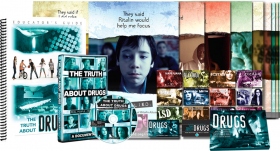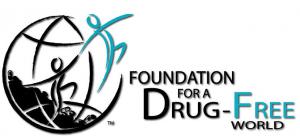Foundation for a Drug-Free World DC chapter challenges others to participate in National Drug and Alcohol Facts Week®

Drug-Free Worldl educator kit available for schools and teachers
National Drug and Alcohol Facts Week® is an annual, week-long, health observance that inspires dialogue about the science of drug use and addiction
National Institute on Drug Abuse (NIDA) encourages community groups and volunteers to "Participate in National Drug and Alcohol Facts Week (NDAFW) and help share facts about drugs, alcohol, and addiction in your community."
"National Drug and Alcohol Facts Week® is an annual, week-long, health observance that inspires dialogue about the science of drug use and addiction among youth. It provides an opportunity to bring together scientists, students, educators, healthcare providers, and community partners to help advance the science, and to address youth drug and alcohol use in communities and nationwide. It was launched in 2010 by scientists at the National Institute on Drug Abuse (NIDA) to stimulate educational events in communities so teens can learn what science has taught us about drug use and addiction," according to the NIDA website.
“Getting as many groups as possible to participate and get out educational information about the harmful effects of drugs is vital,” explains Ms. Thalia Ghiglia of DFW DC. “With the opioid epidemic and the number of lives being lost, this is an important initiative to bring in as many partners as possible, as quickly as possible.”
The Foundation for a Drug-Free World (DFW) is urging others to participate in the upcoming National Drug and Alcohol Fact Week and to join in a national effort to educate the public on the facts about harmful drugs. The Washington, DC, chapter continually disseminates these materials as broadly as possible with well over 100,000 Truth About Drugs booklets distributed in the DC area alone. Many have shown their support and dedication by signing a drug-free pledge, which pledges living drug-free, educating oneself on the topic, and helping others to achieve this as well.
“No one is immune to the dangerous consequences of drinking to excess or using drugs in a harmful manner. The aim is to act now, not wait until it's too late to educate your children, family, and friends,” said Ms. Ghiglia . “All it takes is an effort to communicate with factual information that is simple and easy to understand to have a positive influence. Just one booklet, one short video, could help save lives.”
Abusing drugs can lead to a decline in physical health, mental health issues, relationship issues, violence, and death. According to drugabusestatistics.org, "Accidental drug overdose is a leading cause of death among persons under the age of 45. Over 70,000 drug overdose deaths occur in the US annually. The number of overdose deaths increases at an annual rate of 4.0%." https://drugabusestatistics.org/
Excessive alcohol use, in particular, can be very harmful, but it can often be overlooked. According to the World Health Organization3, "Worldwide, 3 million deaths every year result from harmful use of alcohol."
Thus, drug and alcohol education at an early age is more important than ever. An excerpt from the online Truth About Alcohol booklet from the Foundation for a Drug-Free World explains that:
• Alcohol depresses your central nervous system (brain and spinal cord), lowers inhibitions and impairs judgment. Drinking large amounts can lead to a coma and even death. Mixing alcohol with medications or street drugs is extremely dangerous and can be fatal. Alcohol influences your brain and leads to a loss of coordination, slowed reflexes, distorted vision, memory lapses and blackouts. Teenage bodies are still growing and alcohol has a greater impact on young people’s physical and mental well-being than on older people.
Additionally, the Foundation covers more general information about drugs in their online booklet How Do Drugs Work?:
• Drugs are essentially poisons. The amount taken determines the effect. A small amount acts as a stimulant (speeds you up). A greater amount acts as a sedative (slows you down). An even larger amount poisons and can kill. This is true of any drug. Only the amount needed to achieve the effect differs.
• But many drugs have another liability: they directly affect the mind. They can distort the user’s perception of what is happening around him or her. As a result, the person’s actions may be odd, irrational, inappropriate and even destructive.
Always looking for opportunities to reach individuals and communities, DFW has been most grateful to its many partners who help multiply the reach of the information contained in the educational booklets through their networks. From setting up tables of free information at various Washington, DC, agency events to giving talks for local organizations, DFW has been focused on educating anyone who will listen. Long term studies have shown that knowledge about the dangers of certain drugs has statistically decreased their usage.
The Foundation is offering its Truth About Drugs materials for use in helping others to participate in spreading educational information during this week. These include high-impact, effective drug education materials that address specific drugs and a more general booklet, The Truth About Drugs. These materials can be ordered free by educators and downloaded online by anyone interested in learning about specific drugs.
Internationally, Foundation for a Drug-Free World has distributed millions of copies of booklets around the world in 22 languages. Foundation for a Drug-Free World is a nonprofit public benefit organization headquartered in Los Angeles, California. Used widely by many local community organizations, nonprofits, and service providers, the Truth About Drugs booklets and videos empower youth and adults with the facts so they can make informed decisions and avoid the tragedy of drug overdoses.
Thalia Ghiglia
Drug-Free World
+1 202-667-6404
email us here
1 https://nida.nih.gov/research-topics/parents-educators/national-drug-alcohol-facts-week
2 https://www.drugfreeworld.org/public-service-announcements.html
3 https://www.who.int/news-room/fact-sheets/detail/alcohol



